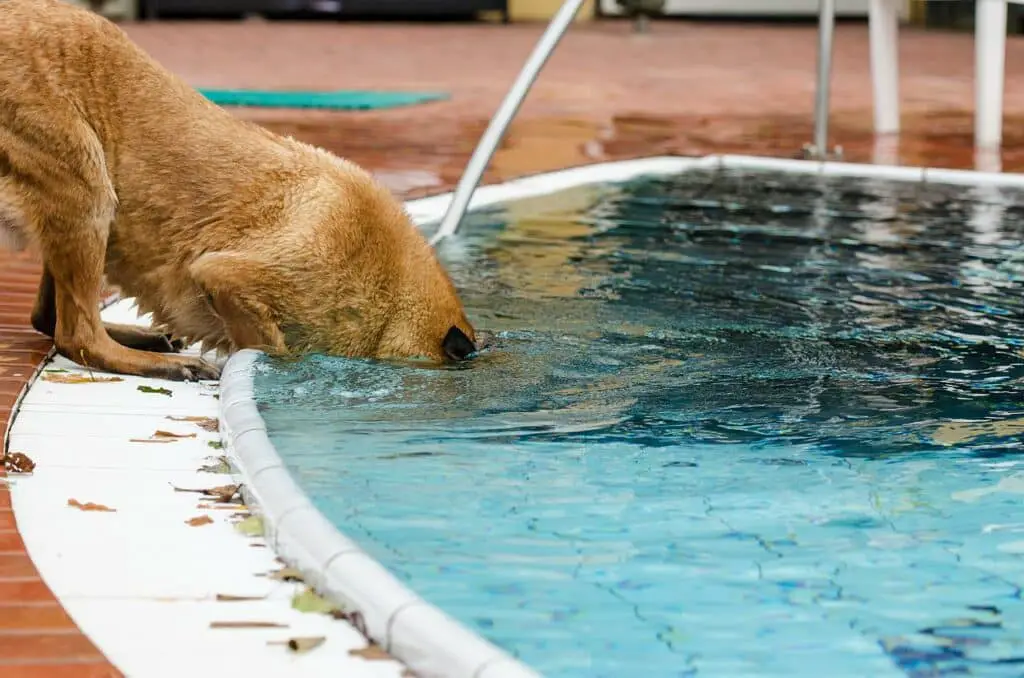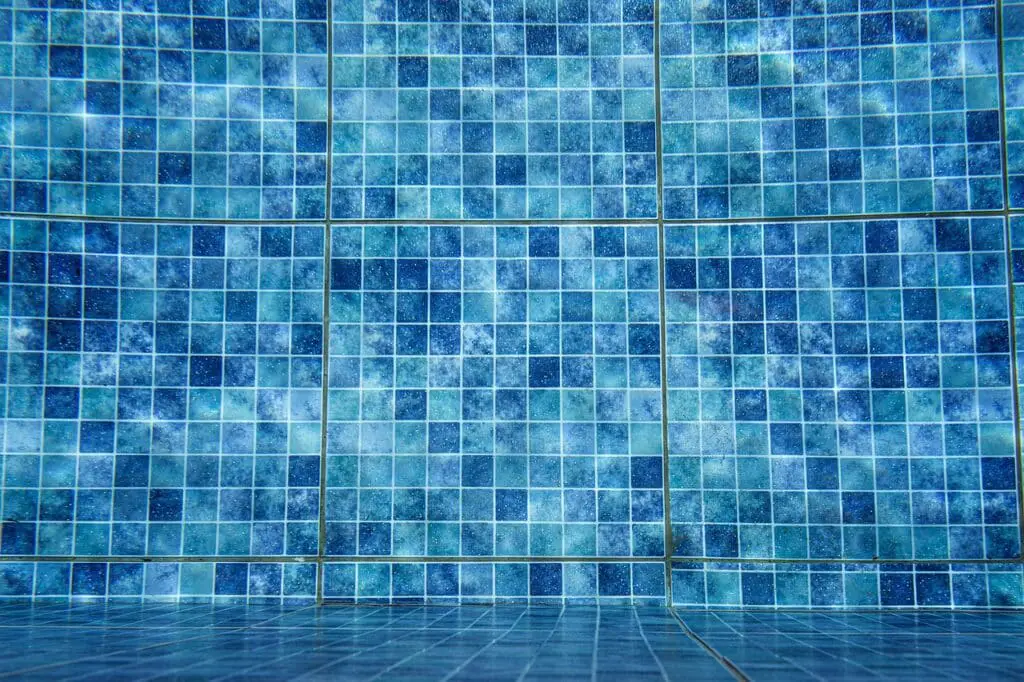Don’t you love a good family hangout at the pool?
Jumping into the pool during summer allows you to cancel the heat while making great memories with everyone, including your pup.
If you’re a dog parent, you’ve seen your dog lapping up the pool water, but is it safe?
So, what happens if your dog drinks pool water?
If your dog takes a few mouthfuls, they may probably not experience anything more than a stomach upset.
However, you should not allow your dog to drink pool water as it can cause stomach upset that may lead to vomiting and burns to the esophagus.
This article will discuss all things pool water and dogs.
It will also explain what you should do to help stop your dog from drinking pool water.

How to stop your dog from drinking pool water
If your dog drinks pool water regularly, you should:
- Give plenty of fresh water – Ensure your dog has access to fresh water in a nearby bowl outside of the pool, along with water-drinking breaks
- Monitor him closely – Look for signs of overheating, dehydration, and heatstroke. It might be warm outside, hence the excessive thirst
- Take him inside – If your dog continues to drink pool water and frequently urinate, take him inside for a break
- Keep him busy – Keep your dog entertained with toys or treats. Allowing your dog to chew on something will keep his mouth full and also busy
- Purchase confining equipment to restrict your dog from accessing the pool. If your dog can’t stop itself from drinking pool water excessively, you might consider buying confining equipment as too much pool water may become a health risk for him

Symptoms of Water Intoxication in Dogs
While this is rare, water intoxication in dogs may occur if your pup drinks copious amounts in one sitting.
Symptoms of water intoxication may include:
- Vomiting
- Bloating
- Lethargy
- Lack of coordination (including stumbling, falling, or staggering)
- Restlessness
- Drooling
- Pale gums
- Dilated pupils
- Glazed eyes
If your dog shows any of these symptoms, rush him to the vet as he may require urgent vet care.
Risks associated with letting your dog drink pool water
Aspiration
Aspiration happens when water enters the lungs while your dog becomes excited in the pool or accidentally aspirates some.
This may result in coughing, gagging, or regurgitation.
It may further cause pneumonia, depending on the amount of water ingested.
If your dog develops aspiration pneumonia, he may require urgent medical care to start treating the symptoms before they worsen.
Signs of pneumonia in dogs include:
- Lack of appetite
- Difficulty breathing
- Lethargy
- Coughing
- Shallow, short breaths
- Fever
- Fatigue
- Hyperventilating
- Blue, grey, or purple mucus membranes
- Green, yellow, or bloody mucus coming from the nose or after a cough
- Blue tint to the lips and gums
Stomach problems
The most prevalent issue associated with dogs drinking pool water is stomach upset.
If your dog frequently drinks pool water, he may be at a higher risk of developing symptoms such as vomiting, regurgitation, and cramping, because of the bacteria and chemicals found in the pool.
If left untreated, these symptoms can lead to intermittent vomiting, resulting in dehydration or even death.
If symptoms persist for more than a day, consult your vet on the way forward,, as he may be reacting to the chemicals.
Salt toxicity
Some pools are salt-water pools and may not contain chemicals such as chlorine or bromine like freshwater pools.
While this may be better for dogs, it isn’t entirely safe either.
If your dog drinks too much water from salt-water pools, it can lead to excessive salt intake.
This may result in electrolyte imbalances which can be lethal for dogs, especially with other health problems like kidney disease.
Other possible dangers of dogs and pools
Drowning
If you allow your dog near the pool alone, he may be at risk of drowning.
While dogs are natural swimmers, getting out of the pool may be challenging.
You can get a dog pool ramp or stairs to prevent the risk of drowning for your pup.
You can also teach them how to use it until they can get out of the pool alone and easily.
Always monitor your dog while in the pool and encourage them to take short breaks while swimming to avoid exhaustion.
You can also get your pup a well-fitting life jacket with a handle that you can easily grab and lift him out of the pool.
Infection
If your dog has floppy ears, he may be prone to ear infections from having damp ears.
Ensure your dog doesn’t swim or drink from the pool to prevent infections.
Dry out the inside of your fido’s ears with a cotton ball while looking out for the signs of itching or discomfort.
Your dog may also experience skin problems from the chemicals in the pool.
However, you should:
- Keep your dog away from the pool if he experiences a reaction after swimming or drinking from the pool
- Give your dog a clean water bath or hose him down after a swim
- Consult with your vet if your dog’s skin irritation gets worse
Pool cleaning chemicals
Pools are typically kept clean using chemicals such as chlorine tablets, muriatic acid, and brominating tablets, which can be extremely toxic to dogs if swallowed.
If your dog ingests these chemicals, he may experience ulcers in the mouth and throat.
To avoid this risk, ensure you:
- Keep all the pool cleaning chemicals tucked away in a safe location
- Take your dog inside or away while pool cleaning is underway
Some of the risks associated with your dog drinking pool water include:
- Toxins – Pool water is often disinfected with chemicals that may be toxic for dogs, including chlorine and bromine. While these chemical levels are kept low, above normal levels may cause issues such as burns to the esophagus. If your dog is allergic to any of these chemicals, he may experience a reaction
- Bacteria – Pools, however well maintained, can be a breeding ground for bacteria and other fungi. Bacteria such as E. coli can cause diarrhea or blood poisoning in dogs, especially puppies. If left untreated, this bacteria can result in death

In conclusion
While one or two gulps of pool water may not be toxic to your dog, it’s best to avoid it altogether as it may cause more harm than good.
You should always check that the chemical contents stay balanced in your pool while ensuring you keep your fido safe.
If your dog drinks pool water, consult your vet for further directions.
- What Dog Breeds Have Pink Skin? - March 24, 2023
- What Are the Most Inspiring Dog Breeding Quotes? - March 20, 2023
- Can Pheromone Spray Help Improve Dog Breeding Results? - March 19, 2023








